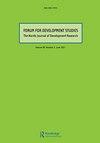“坦桑尼亚女士优先”能成为女运动员继续运动的导火索吗?
IF 1.1
Q3 DEVELOPMENT STUDIES
引用次数: 0
摘要
在坦桑尼亚,体育参与方面的性别差距主要是由于社会文化和经济的影响,部分原因是由于向市场经济的过渡和乌干达政策。与男性相比,女性参与体育运动的比例较低的原因之一是,许多女孩在小学毕业后放弃了继续从事体育运动。在这种情况下,自2017年以来举行了坦桑尼亚妇女优先(LF),这是一项专门为妇女举办的全国性体育比赛。本文采用问卷调查和随机访谈的方法,对入选和未入选的坦桑尼亚女运动员及其父母进行问卷调查,采用定量和定性相结合的分析方法,考察了优秀女运动员的LF在继续运动中的作用。本研究发现,参与LF可以促进后续运动的延续。另一方面,在向市场经济转型的背景下,本文表明,LF可能有固定的社会和经济结构,只允许少数优秀的女运动员继续从事体育运动,而不是扩大女性参与体育运动,这与LF的精神背道而驰。本文认为,在市场经济的背景下,有必要向更广泛的受众和媒体推广全民LF意识,使LF对女性和私营公司更具吸引力。本文还建议在女学生中引入体育生活技能培训,鼓励她们在离开学校后继续从事体育运动。本文是作为JICA Ogata研究所题为“通过体育进行和平与发展研究”的项目的一部分编写的。作者对日本国际协力事业团绪方研究所和坦桑尼亚日本国际协力事业团的工作人员表示感谢。本文中表达的观点和解释以及任何错误都是我个人的观点和解释,不一定是JICA的观点和解释。披露声明作者未报告潜在的利益冲突。注1坦桑尼亚被细分为31个地区(截至2016年)关于IWGWS,请参阅http://www.iwg-gti.org4 https://www.findeasy.in/population-of-tanzania/,访问时间为2023年2月5日。其他信息:作者简介古川光明是日本静冈大学国际关系学教授。他的研究领域包括建设和平、战后发展、体育促进发展与和平以及可持续发展目标。本文章由计算机程序翻译,如有差异,请以英文原文为准。
Can ‘Tanzania Ladies First’ be a Trigger for Female Athletes to Continue in Sport?
AbstractIn Tanzania, the gender gap in sports participation remains largely due to socio-cultural and economic influences, partly due to the transition to a market economy and the Ujamaa policy. One of the reasons for lower participation of women compared with men is that many girls give up continuing with sport after primary school. In this situation, the Tanzania Ladies First (LF), a national sports competition exclusively for women, has been held since 2017. In this paper, a questionnaire survey and random interviews were conducted with selected and non-selected athletes for Tanzanian LF, and their parents to examine the role of the LF in the continuation of elite female athletes’ sport by using a mixed method of quantitative and qualitative analysis. This paper found that participation in LF boosts subsequent continuation in sport. On the other hand, in the context of the transition to a market economy, this paper shows that LF may have fixed social and economic structures that allow only a few elite women athletes to continue in sport, rather than expanding women's participation in sport, which runs counter to the spirit of LF. This paper suggests that in the context of a market economy, it will be necessary to promote national awareness of LF to a wider audience and media to make LF more attractive to women and private companies. This paper also recommends the introduction of life skills training through sport for female students to encourage them to continue with sport after leaving school.Keywords: womensportathleticsTanzaniasub-Saharan Africa AcknowledgementsThis paper has been prepared as part of a JICA Ogata Research Institute project entitled ‘Study on Peace and Development through Sport’. The author is grateful to the staff of the JICA Ogata Research Institute and JICA Tanzania. The views and interpretations expressed in this paper and any errors are my own and not necessarily those of JICA.Disclosure statementNo potential conflict of interest was reported by the author(s).Notes1 Tanzania is subdivided into 31 regions (as of 2016).2 The declaration is available at https://www.icsspe.org/sites/default/files/Brighton%20Declaration.pdf.3 Regarding IWGWS, please see http://www.iwg-gti.org4 https://www.findeasy.in/population-of-tanzania/ Access in Feb. 5, 2023Additional informationNotes on contributorsMitsuaki FurukawaMitsuaki Furukawa is a professor of International Relations at the University of Shizuoka, Japan. His research explores peacebuilding, post-war development, sports for development and peace, and SDGs.
求助全文
通过发布文献求助,成功后即可免费获取论文全文。
去求助
来源期刊

FORUM FOR DEVELOPMENT STUDIES
DEVELOPMENT STUDIES-
CiteScore
1.80
自引率
14.30%
发文量
24
期刊介绍:
Forum for Development Studies was established in 1974, and soon became the leading Norwegian journal for development research. While this position has been consolidated, Forum has gradually become an international journal, with its main constituency in the Nordic countries. The journal is owned by the Norwegian Institute of International Affairs (NUPI) and the Norwegian Association for Development Research. Forum aims to be a platform for development research broadly defined – including the social sciences, economics, history and law. All articles are double-blind peer-reviewed. In order to maintain the journal as a meeting place for different disciplines, we encourage authors to communicate across disciplinary boundaries. Contributions that limit the use of exclusive terminology and frame the questions explored in ways that are accessible to the whole range of the Journal''s readership will be given priority.
 求助内容:
求助内容: 应助结果提醒方式:
应助结果提醒方式:


